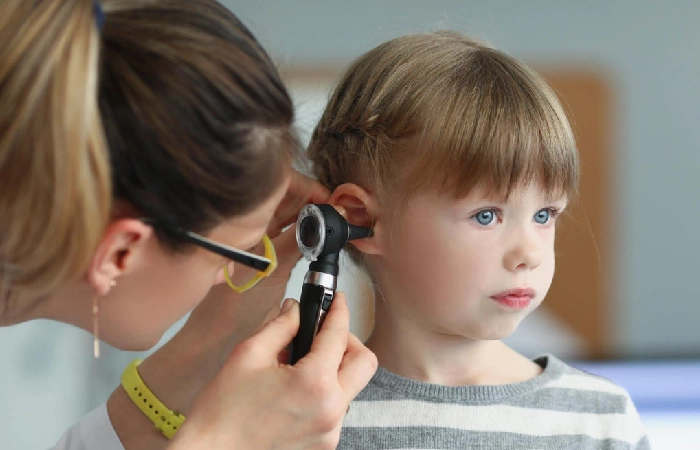Snoring in Children: Many parents are concerned when their children snore, and they may decide to consult a doctor for advice. Periodic snoring may not seem concerning, but persistent snoring may point to a problem that needs to be addressed. As parents, we may successfully handle this issue by being aware of the causes and consulting experts, especially in London. This thorough book will help worried parents manage their child’s snoring by examining various aspects of kid snoring, delving into its possible origins, and offering insightful advice from ENT specialists in London.
Table of Contents
Understanding Childhood Snoring
Snoring occurs when air flows through the passages at the back of the mouth and nose and is partially obstructed during sleep. While it is commonly associated with adults, snoring in children is not uncommon and can be attributed to various factors. Parents must distinguish between occasional snoring and persistent snoring because the latter may indicate a health problem that requires attention.
Common Causes of Snoring in Children

Expanded Tonsils and Adenoids: One of the leading causes of children’s snoring is an enlargement of the tonsils or adenoids. Snoring as you sleep might be caused by obstructions in the airway caused by these soft tissues in the back of the throat.
Allergies and Nasal Congestion: Children who suffer from allergies or chronic nasal congestion may experience snoring due to the blockage of nasal passages. Seasonal allergies or exposure to allergens such as dust mites or pet dander can exacerbate this condition.
Obesity: Narrowing the airways caused by obesity can cause snoring. However, it is less common in children than adults. Overweight children may have extra tissue in their throats, which can block airflow and cause snoring.
Structural Abnormalities: Some children may be born with structural abnormalities in their airways, such as a deviated septum or narrow nasal passages, which can predispose them to snoring.
Sleep Apnea: In extreme situations, children’s snoring may indicate obstructive sleep apnea (OSA). Breathing pauses and irregular sleep patterns result from OSA, which is caused by partial or total airway blockage during sleep.
Seeking Help from ENT Specialists and Snoring Specialists in London

For parents in London to properly deal with their child’s snoring problems, consulting with ENT and snoring specialists is essential. These experts are qualified to identify the underlying reasons with accuracy and suggest the best course of action for therapy.
Snoring Specialist London
Many well-known snoring specialists in London are experts at identifying and treating sleep-related issues in adults and kids. To offer complete care customised to meet the needs of each patient, these professionals frequently work in conjunction with ENT specialists. To resolve their concerns about their child’s snoring, parents can immediately book meetings with these specialists or ask their paediatricians for recommendations.
ENT Specialist in London
Otolaryngologists, or ENT experts, are medical practitioners who specialise in diagnosing and treating conditions of the nose, throat, and ears. ENT specialists in London are essential when assessing kids who snore, especially regarding any physical anomalies in the airways. They identify the underlying cause of snoring using various diagnostic methods and instruments and then create tailored treatment programmes.
Tips for Concerned Parents

Monitor Your Child’s Snoring: Keep a journal documenting your child’s snoring patterns, including frequency, intensity, and associated symptoms such as gasping or choking sounds during sleep. This information can be invaluable for healthcare professionals in diagnosing the underlying cause.
Maintain a Healthy Weight: Encourage your child to maintain a healthy weight through a balanced diet and regular physical activity. Obesity can contribute to snoring by increasing the amount of fatty tissue around the throat, leading to airway obstruction.
Address Allergies and Nasal Congestion: Work with your child’s paediatrician or ENT specialist to effectively manage allergies and nasal congestion. This may involve identifying and avoiding triggers, using nasal saline sprays or antihistamines, or exploring allergy immunotherapy options.
Establish a Good Sleep Routine: Create a conducive sleep environment for your child by establishing a consistent bedtime routine and ensuring they sleep in a comfortable, quiet, dark room. Limiting screen time before bedtime and promoting relaxation techniques can also improve sleep quality.
Examine Sleep Apnea Screening: If your child’s snoring is severe and accompanied by additional symptoms like irritability, difficulty focusing, or daytime tiredness, you should talk to a specialist about the potential of a sleep apnea screening. Clinical sleep studies can reveal important information about your child’s sleep habits and aid in the diagnosis of underlying sleep disorders such as OSA.
Conclusion
Although snoring in children can be extremely difficult for parents to deal with, it can be efficiently handled with the correct strategy and advice from ENT and snoring specialists in London. Parents can assist their children in achieving optimal health and restful sleep by comprehending the possible causes and putting the right strategies into practice. Recall that early intervention is the secret to ensuring your child has a healthy and peaceful sleep and putting them on the path to a better, healthier future.
